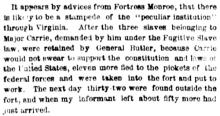THE FUGITIVE SLAVE QUESTION
Washington, May 29, 1861.
Colonel Butler, the brother of General Butler, is here to ask for instructions as to the disposal of the slaves now hourly seeking protection among the federal troops in and about Fortress Monroe. The matter has been before the Cabinet, but no definite conclusion has as yet been arrived at. The action of General Butler in the premises will doubtlessly be sustained.
It appears by advices from Fortress Monroe, that there is likely to be a stampede of the “peculiar institution” through Virginia. After the three slaves belonging to Major Carrie, demanded by him under the Fugitive Slave law, were retained by General Butler, because Carrie would not swear to support the constitution and laws of the United States, eleven more fled to the pickets of the deferral forces and were taken into the fort and put to work. The next day thirty- two were found outside the fort, and when my informant left about fifty more had just arrived.
General Butler is desirous of receiving instructions from the government as to what disposition he shall make of these people. Under the laws of Virginia they are property, and will be retained when known to belong to traitors, but any escaping from loyal men will be promptly returned, under the laws.
From percent appearances we shall have a very sudden decrease of the slave population in many of the slave States. Under the rule, whenever the federal forces march, slavery will disappear. The subject of disposing of the slaves when get free is new before the Cabinet. As the slaves thus liberated suddenly become men, and will be recognized as such by General Butler, the question arise whether they cannot be sent North on their parole of honor.
"The Fugitive Slave Question," New York (NY) Daily Herald, May 30, 1861, p. 1.

